Have you ever entered a gym feeling like you own the place, walked past the dumbbell rack and noticed the iron tremble in fear, and turned on the treadmill only to realize you’ve already done your target calories? If you’re nodding your head, chances are you are a pre-workout supplement connoisseur.
When used correctly, pre-workouts can be one of the most effective supplements. They’ll help you psyche up for a workout, improve your strength, endurance, and stamina, and deliver muscle-ripping pumps.
Pre-workouts can help you break through a plateau and set new personal records in the gym. They can be your confidant when you are feeling low and need someone to push you through a workout.
However, pre-workout supplements are not for everyone. This article details the nine best pre-workout powder alternatives to help you make the most of your time in the weight room. We also discuss how you should take these pre-workout alternatives for the best results. So, sit tight and read on.
What is a Pre-Workout Supplement?
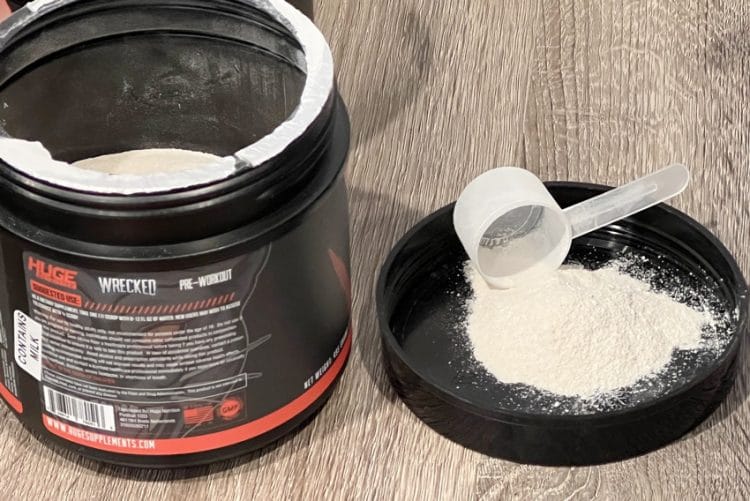
For hardcore lifters, a pre-workout supplement is a godsend. It uses ingredients like beta-alanine, l-citrulline, arginine, l-theanine, taurine, BCAAs, creatine, and caffeine to boost your training performance. Different pre-workout supplements use different dosages of these ingredients to set themselves apart. [1][2]
Pre-workout supplements help boost your energy levels, improve mental focus, delay the onset of fatigue, and deliver better muscle pumps. Most popular pre-training supps deliver a solid punch of caffeine with every serving. Folks that cannot handle high doses of caffeine can opt for non-stim pre-workout powders. There is something for everyone in the pre-workout market.
Nonetheless, pre-workout supplements can be pricey and burn a hole in your pocket. While some lifters avoid pre-training powders because of their hefty price tags, others turn their back on them after developing a tolerance.
If you’re on a shoestring budget, rebounding, or want to try a natural pre-workout, you’ve come to the right place.
What is a Pre-Workout Supplement Alternative?
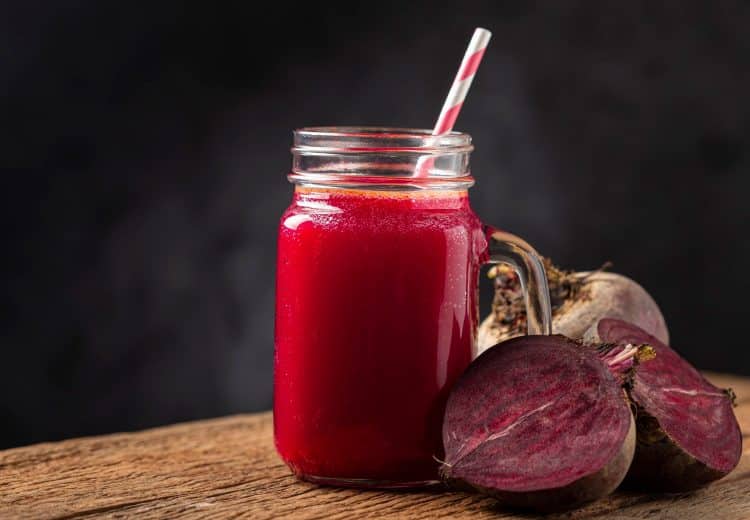
Whether you look up pre-workout supplement alternatives online or ask your friendly neighborhood gym bro about it, you’ll be herded toward energy drinks or standalone pre-workout ingredients.
If you’re chugging Reign energy drinks or beta-alanine capsules in the name of pre-workout supplement alternatives, you have some soul-searching to do. Your kitchen doesn’t have to turn into a Breaking Bad drug superlab for prepping the perfect pre-workout concoction.
In this article, we focus on the nine natural foods (and beverages) you can consume before a workout to improve your training performance.
Arriving at the perfect natural pre-workout meal requires time and effort. It isn’t as easy as popping out a tub and stirring a rainbow-colored drink. You must balance your pre-workout macro (protein, carbs, and fats) and micronutrient content to ensure you have all the required nutrients in the right quantity to last a workout. It will also kickstart your recovery process, helping you get bigger and stronger.
Read also: Beets Pre-Workout: The Natural Way to Take Your Workouts to the Next Level
Requisites of a Pre-Workout Supplement Alternative
Here are the five must-have properties of a natural pre-workout:
Boost Energy
Your workout is as good as your energy levels. When was the last time you hit a PR feeling lethargic and sleepy? Correct, never.
A pre-workout supplement alternative should get you fired up. You don’t necessarily have to eat or drink a caffeine-loaded drink for an energy rush. Consuming your favorite nutrient-dense whole food should do the trick.
Must Read: What Does PR Mean in Gym?
Enhance Performance
Natural pre-workout alternatives should contain nutrients like potassium and electrolytes that can help improve your performance in the weight room. Focus on ingredients that boost your endurance, strength, and power output, and reduce fatigue.
Improve Focus
The mind-muscle connection is the name of the game in strength sports. You need a robust focus to keep your workout intensity and output high. Green tea, blueberries, and leafy green vegetables are some foods and beverages that can help boost your focus. [3]
Cost-Effective
You don’t want a real food pre-workout that costs the same as a supp. The good news is that most pre-workout supplement alternatives are budget-friendly and deliver good value for money.
Nutrient-Dense
We’ll stick with nutrient-dense whole foods for our top natural pre-workout supplement alternatives. Whole foods are healthier and safer than processed foods and can lower the risk of contracting chronic diseases. Always look at your food’s macro and micronutrient information before making dietary choices. [4]
9 Best Pre-Workout Powder Alternatives
Here are the nine best pre-workout supplement alternatives to add to your pre-training ritual:
Water

Yup, you read it right. Water. Plain water without the beta-alanine-loaded fairy dust. You must stay hydrated throughout the training session for optimal performance and results. Furthermore, sipping on water throughout your workout will help avoid dehydration, which can result in fatigue, dizziness, and muscle cramping. [5]
Drinking water before and during your workout will lower your body’s core temperature and prevent overheating. It also aids in maintaining electrolyte balance, which is essential for proper muscle and nerve function, improving blood circulation, and boosting cognitive function.
Nut Butter

Nut butter is a hit among fitness enthusiasts. They are healthy and delicious and deliver a healthy dose of fats. Nut butter also contains a decent amount of protein. Combine it with a complex carb such as whole grain bread for a quick meal.
Peanut butter, almond butter, cashew butter, hazelnut butter, pistachio butter, Macadamia nut butter, pecan butter, and walnut butter are the different kinds of nut butter available on the market. You can also get them in powdered form to add to your smoothies. [6]
Nut butter is a great pre-workout supplement alternative for longer low and moderate-intensity training sessions as it stays in your system for longer and can deliver a steady energy release.
Carbs
Carbs are broken down into glucose and stored as glycogen in the body. Glycogen is your body’s primary energy source. You must consume carbs in your pre-training meal, especially before a HIIT (high-intensity interval training) session.
Your pre-workout meal should have a balance of simple and complex carbs.
Simple Carbs
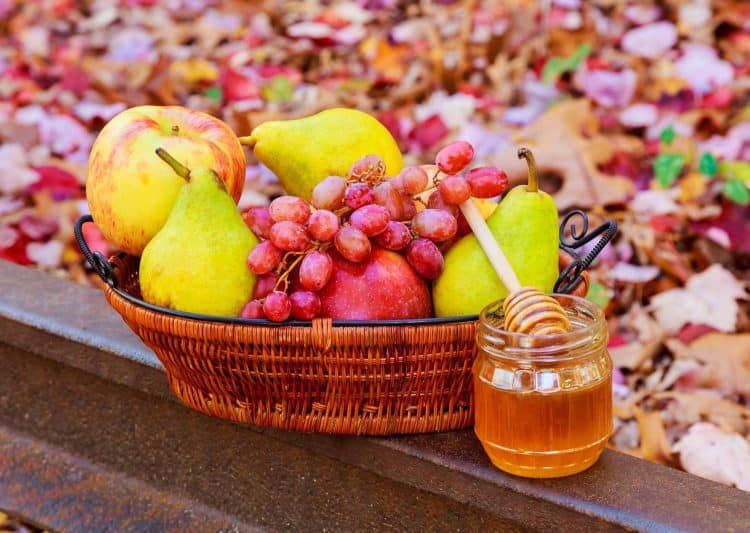
Although processed sugars get simple carbs a bad rap, simple carbs are much more than that. Simple carbs are present in fruits, vegetables, and honey. They digest quickly and deliver a solid punch of energy. You should consume simple carbs 30-60 before a workout.
Types of simple carbs:
- Glucose: fruits, vegetables, and honey
- Fructose: fruits, vegetables, and honey
- Galactose: milk and dairy products
- Sucrose: table sugar, sugar cane, sugar beets, and many processed foods
- Lactose: milk and dairy products
- Maltose: grains and beer
- High-fructose corn syrup (HFCS): processed foods and beverages
Complex Carbs
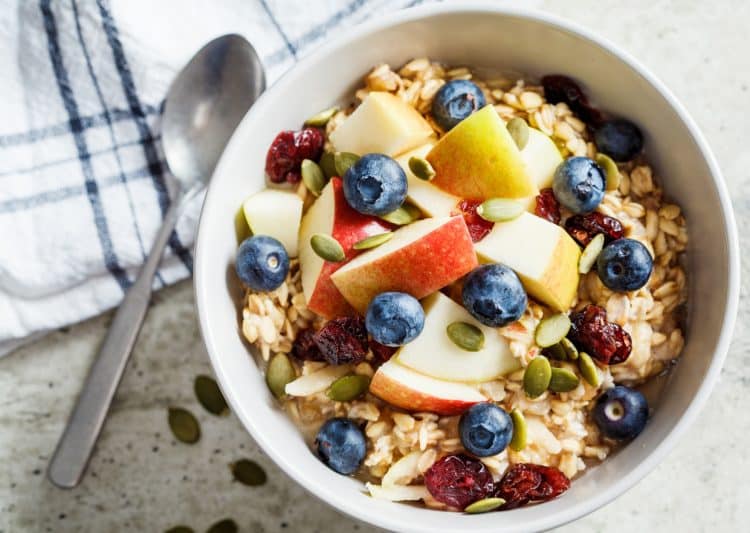
Complex carbs are the more popular type of carbs. They take longer to digest than simple carbs, and you must consume them two to three hours before a training session for the best results. Complex carbs deliver a more sustained energy release than simple carbs.
Types of complex carbs:
- Fruits: apples, bananas, and berries
- Grains: wheat, oats, rice, and barley
- Vegetables: sweet potatoes, yams, corn, and peas
- Legumes: lentils, chickpeas, and beans
Nitrate-Rich Vegetables
Vegetables such as spinach, lettuce, fennel, rocket, radishes, Chinese cabbage, and parsley are rich in nitrates. Nitrates are the precursor to nitric oxide, which can help achieve better muscle pumps during a workout by dilating blood vessels and improving blood and oxygen supply to the muscles. [7]
Eating nitrate-rich vegetables before a workout can improve exercise performance and recovery. Furthermore, they have antioxidant and anti-inflammatory properties, helping reduce muscle damage and exercise-induced inflammation.
Greek Yogurt
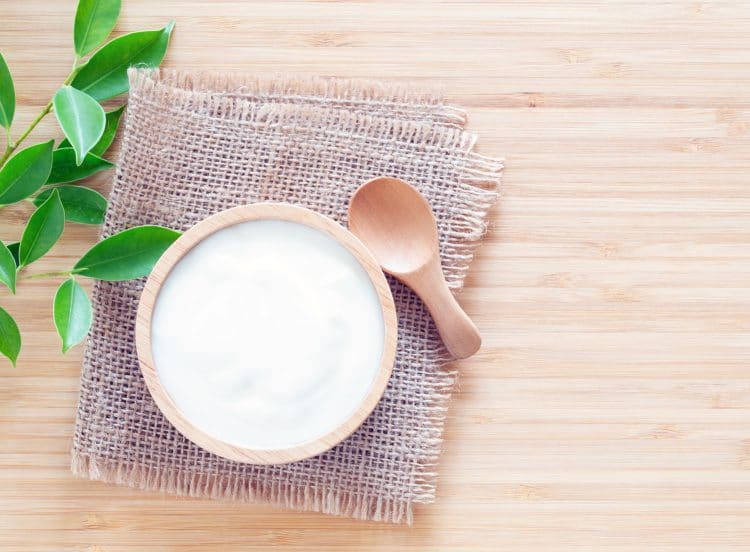
Greek yogurt is a hit among gym-goers because it is packed with protein, which helps build and repair muscle tissues. Its probiotic properties improve your gut health and ensure that your body absorbs the most nutrients from your meals.
Greek yogurt is available in dairy, non-dairy, sweetened, zero-sugar, full-fat, or lower-fat options. Plus, Greek yogurt is incredibly versatile and can be combined with other foods on this list for a complete pre-workout meal.
MCTs
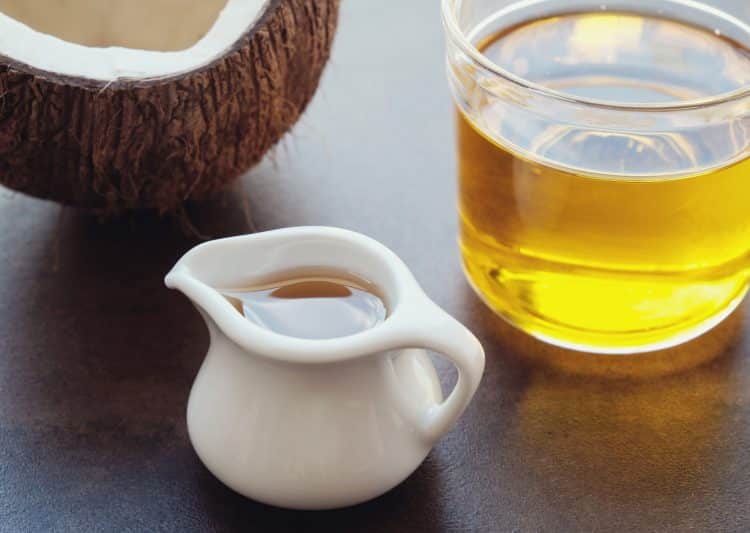
MCTs are often overlooked in pre-training nutrition. MCT oil is easily absorbed by the body and converted into ketones for use as fuel during workouts. It can also help boost endurance and reduce fatigue. [8]
Since MCT oil is converted into ketones, it ramps up the fat-burning process during exercise. It is especially useful for people following the keto diet. Furthermore, it can help control appetite, reduce cravings, and boost cognitive function. You can easily add MCT oils to your whole food pre-workout meals.
Check Out: 10 Best MCT Oils Reviewed in 2023
Smoothies
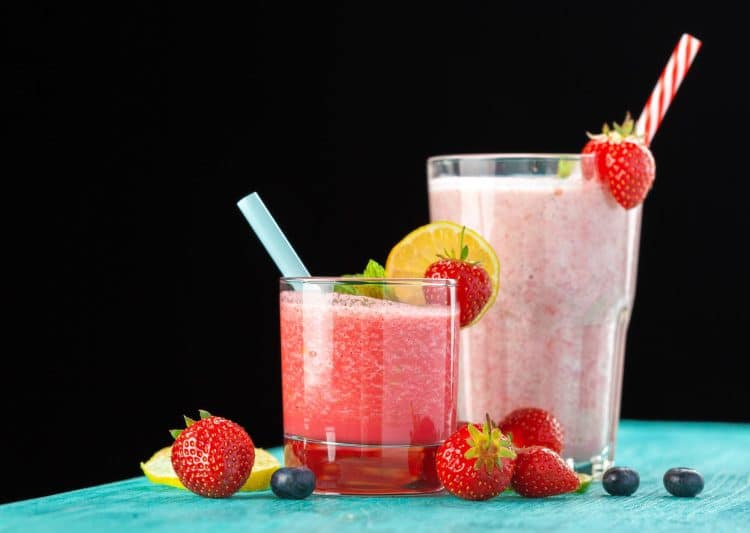
Smoothies are one of the most convenient pre-workout meals, especially for folks that train in the morning. They allow you to blend multiple nutrient-rich and delicious whole foods for a satiating and energizing meal.
Smoothies can also help with staying hydrated during a workout. You should include water, coconut water, or other hydrating liquids if you sweat a lot or train in hot or humid conditions. Plus, smoothies are easy to digest, making them perfect for consuming 30 to 60 minutes before a training session.
Related: Simple Delicious High Protein Smoothie Recipe
Caffeine
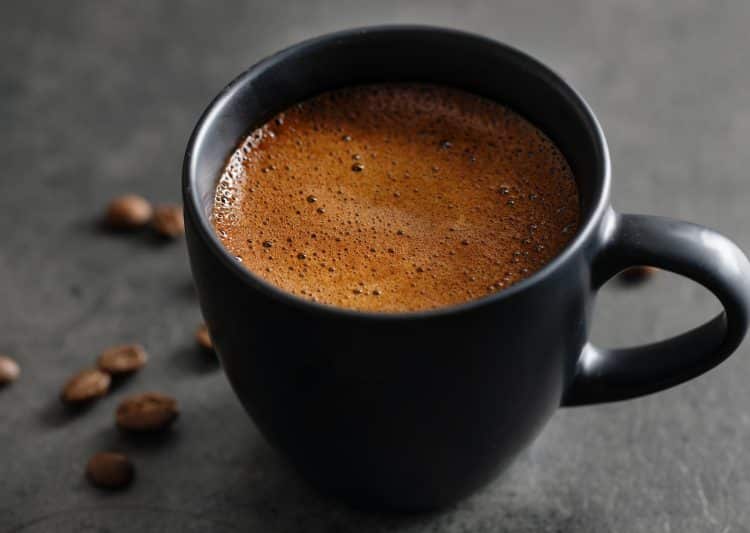
Black coffee, tea, or green tea are the best sources of caffeine before a training session. Caffeine is a staple in stimulated pre-workout supplements for a reason. It is incredibly effective in boosting your energy levels, endurance, stamina, and focus. [9]
You must, however, ensure that you consume a moderate amount of caffeine before a workout. Avoid consuming more than two cups of black coffee before a workout to avoid feeling jittery, nauseous, and experiencing a caffeine crash.
One 8-ounce cup of coffee contains 95 mg of caffeine, which should be enough to get you through a 60-90 minute training session. Consume caffeine 30-45 minutes before a workout for the best results.
Concentrated Breathing

You don’t need to go crazy with your diet to get the most out of your training regimen. Breathing exercises before a training session help stimulate your nervous system and prepares your lungs to work at their max capacity.
Concreated breathing, also known as deep breathing or diaphragmatic breathing, is one of the best-kept secrets of elite athletes. Watch a pre-performance ritual of an A-lister, and you’ll likely see them doing some kind of breathing exercise.
Concentrated breathing is one of the handiest pre-workout supplement alternatives. They take 5-10 minutes, and you’ll find a treasure of guided breathing routine videos on YouTube. Do them right before a workout.
What To Avoid in a Pre-Workout Supplement Alternative
What you should avoid is just as important as what you should consume before a workout. Here are some of the foods and beverages that you should stay away from close to a training sesh:
- High-fat foods (fried foods or fatty cuts of meat)
- Sugary drinks (soda and carbonated drinks)
- Alcohol
- Spicy foods
- Large meals
You must also closely watch your body’s response to different foods and beverages. Avoid foods that cause gastrointestinal issues and make you feel bloated or run to the bathroom during a training session.
Related: Best Pre-Workout Meal — What to Eat Before Training
How to Incorporate Pre-Workout Alternatives into Your Routine
Now that you know the nine best pre-workout supplement alternatives here is how to include them into your routine:
Consider Your Training Goal
You must begin by breaking down your training objectives. Endurance athletes must load up on carbs before a training session. Alternatively, balance your protein, carbs, and fats if you train for hypertrophy or follow a low to a medium-intensity training session.
You must also consider your electrolyte and potassium intake. Try including a banana and coconut water in your pre-workout meal to make the most of your training session.
Timing
Different foods take a varying amount of time to digest and take effect. Note the time it takes for your body to break down different foods and program them accordingly. Eating multiple pre-training meals might be inconvenient, but the results are worth it.
Dosage
You want to eat enough to be satiated and have enough energy to last through a workout. However, you must avoid going overboard with your pre-workout supplement alternatives. You’re going too hard on your pre-training meals if they make you feel bloated and sluggish.
Safety Precautions
You must consult a healthcare professional before switching to a new diet, especially if you have pre-existing health conditioning or are allergic to certain foods.
Next Read: What To Mix With Protein Powder (26 Delicious Options)
Wrapping Up
Sports supplement companies spend thousands, if not millions, of dollars developing a pre-workout supplement. You shouldn’t expect to nail your natural pre-workout on the first try and expect it to work better than commercial pre-workout powders.
Note how your body reacts to different foods 30, 60, 90, and 120 minutes before a workout, and then design a pre-training diet plan to maximize your endurance, stamina, energy levels, and concentration. Best of luck!
References
- Martinez N, Campbell B, Franek M, Buchanan L, Colquhoun R. The effect of acute pre-workout supplementation on power and strength performance. J Int Soc Sports Nutr. 2016 Jul 16;13:29. doi: 10.1186/s12970-016-0138-7. PMID: 27429596; PMCID: PMC4947244.
- Harty PS, Zabriskie HA, Erickson JL, Molling PE, Kerksick CM, Jagim AR. Multi-ingredient pre-workout supplements, safety implications, and performance outcomes: a brief review. J Int Soc Sports Nutr. 2018 Aug 8;15(1):41. doi: 10.1186/s12970-018-0247-6. PMID: 30089501; PMCID: PMC6083567.
- Travica N, D’Cunha NM, Naumovski N, Kent K, Mellor DD, Firth J, Georgousopoulou EN, Dean OM, Loughman A, Jacka F, Marx W. The effect of blueberry interventions on cognitive performance and mood: A systematic review of randomized controlled trials. Brain Behav Immun. 2020 Mar;85:96-105. doi: 10.1016/j.bbi.2019.04.001. Epub 2019 Apr 15. PMID: 30999017.
- Bansal S, Connolly M, Harder T. Impact of a Whole-Foods, Plant-Based Nutrition Intervention on Patients Living with Chronic Disease in an Underserved Community. Am J Lifestyle Med. 2021 Jun 6;16(3):382-389. doi: 10.1177/15598276211018159. PMID: 35706591; PMCID: PMC9189580.
- Maughan RJ, Meyer NL. Hydration during intense exercise training. Nestle Nutr Inst Workshop Ser. 2013;76:25-37. doi: 10.1159/000350225. Epub 2013 Jul 25. PMID: 23899752.
- Muscella A, Stefàno E, Lunetti P, Capobianco L, Marsigliante S. The Regulation of Fat Metabolism During Aerobic Exercise. Biomolecules. 2020 Dec 21;10(12):1699. doi: 10.3390/biom10121699. PMID: 33371437; PMCID: PMC7767423.
- Sweazea KL, Johnston CS, Miller B, Gumpricht E. Nitrate-Rich Fruit and Vegetable Supplement Reduces Blood Pressure in Normotensive Healthy Young Males without Significantly Altering Flow-Mediated Vasodilation: A Randomized, Double-Blinded, Controlled Trial. J Nutr Metab. 2018 Sep 16;2018:1729653. doi: 10.1155/2018/1729653. PMID: 30305961; PMCID: PMC6165613.
- Wang Y, Liu Z, Han Y, Xu J, Huang W, Li Z. Medium Chain Triglycerides enhances exercise endurance through the increased mitochondrial biogenesis and metabolism. PLoS One. 2018 Feb 8;13(2):e0191182. doi: 10.1371/journal.pone.0191182. PMID: 29420554; PMCID: PMC5805166.
- Paluska SA. Caffeine and exercise. Curr Sports Med Rep. 2003 Aug;2(4):213-9. doi: 10.1249/00149619-200308000-00008. PMID: 12834577.


